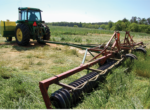Advertise Follow Us
Items Tagged with 'brassicas'
ARTICLES
Best management practices for terminating winter cereal forages and cover crops with pre-plant burndown programs.
Read More
Tips for Getting Cover Crops to Pay Off from the Starting Gate
Kansas no-tiller John Stigge believes cover crops can deliver in year one if growers utilize the ‘power of 3’ that includes legumes, brassicas and grasses.
Read More
Taming No-Till Challenges with a Multi-Pronged Approach
Brian Hildebrand uses sanitation, competition and rotation to fight no-till diseases, weeds, pests and climate obstacles on the Canadian Prairies.
Read More
Free eGuide
The Pluses and Minuses of Today's Most Popular Cover Crops
Now is the time to choose the right cover crop species to improve YOUR no-till operation. “The Pluses and Minuses of Today’s Most Popular Cover Crops” report reveals how you can pick and utilize the cover crop species that are perfect for your farm, and it’s FREE!
Read More
20 Ways To Build Better No-Till Soils
World-renowned soil scientist and Rhizoterra co-founder Jill Clapperton shares tips and insights about no-tilled soils that could help growers lower their productivity costs and increase yields.
Read More
Killing The Most Popular Cover Crops — The Right Way
Effective termination of cover crops is essential if no-tillers are to get the best results from their seeding and establishment efforts.
Read More









